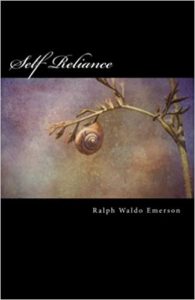
Self-Reliance
By Ralph Waldo Emerson
52 pages
First published in 1841
Something about the word bothered me. If a writer was described as a “transcendentalist,” I didn’t want to read him. (Talk about prejudice. I didn’t even know what the term meant.) So when Emerson’s famous essay, Self-Reliance, was assigned as supplementary reading in my Emily Dickinson class, I crossed it off my list.
I had a free morning at the Swamp House last Sunday, and so, when I noticed an old copy of Self-Reliance (perhaps the one I never read in college) tucked among much larger books, I sat down on the dock as the mist was lifting off the lake and read it.
I’m glad I did. In fact, I feel foolish for having avoided it all these years.
The essay has two major themes. The first is the one that most people talk about: Emerson’s contention that community is a distraction to self-growth. He advocates self-imposed isolation to allow more time for “reflecting on one’s self.”
What’s wrong with that is apparent to anyone that has spent a lifetime thinking. It’s also apparent to neurobiologists that understand the brain’s vital need for connection and community to stay healthy.
This idea seemed to me to be the brainchild of a young man, a writer that should have waited a few more decades before tackling the topic. In fact, Emerson was 58 when he wrote Self-Reliance.
The second major theme in the essay I very much like: Emerson’s belief in the importance of developing an independent mind. Thinking what you get from history books or editorial opinions is not serious thinking, he argues. In fact, the only possible way to think independently is to be a nonconformist. You should do what you think is right and (very important) is true based on your own experience, he says, no matter what others think or even what the community dictates you do.
If you think and act independently, Emerson warns, you will feel the scorn of “the cultivated classes.” That may be unpleasant, he says, but it is relatively easy to ignore. The outrage of the masses, though, is difficult to endure. “Only the unusually independent person can stand firmly against the rancor of the whole of society.”
Allowing yourself to be swayed by community opinion is a great mistake, he says. It will leave you with a head full of opinions that you haven’t seriously examined – thoughtless prejudices crowding out your ability to discover what is true.
“Envy is ignorance,” says Emerson. And “imitation is suicide.”
In the Orwellian world we have drifted into, Self-Reliance is more relevant than ever.
Critical Reviews
* “The reader may find no better writer than Emerson to help make the leap into self-reliant freedom. It is difficult to read Self-Reliance simply as an historical work, because you are easily pulled into Emerson’s orbit of pure responsibility and self-awareness, a world in which there are no excuses, only opportunities for greatness.” (Tom Butler-Bowdon)
* “Emerson’s aphorisms are forceful, his cadences dizzying, his appeal to individual will seductive.” (Jenny Odell in The Paris Review)
Interesting Facts
* Self-Reliance is the source of one of Emerson’s most famous quotations: “A foolish consistency is the hobgoblin of little minds.” It is a truncated version of this longer excerpt from the essay: “A foolish consistency is the hobgoblin of little minds, adored by little statesmen and philosophers and divines. With consistency a great soul has simply nothing to do. He may as well concern himself with his shadow on the wall.”
* The hobgoblin quote has shown up several times in the movies. It was a running joke in the 1998 film Next Stop Wonderland, and was used in 1989’s Dream a Little Dream in reference to a group of teenagers. It was also in an episode of the television show The Mentalist.
 MarkFord
MarkFord